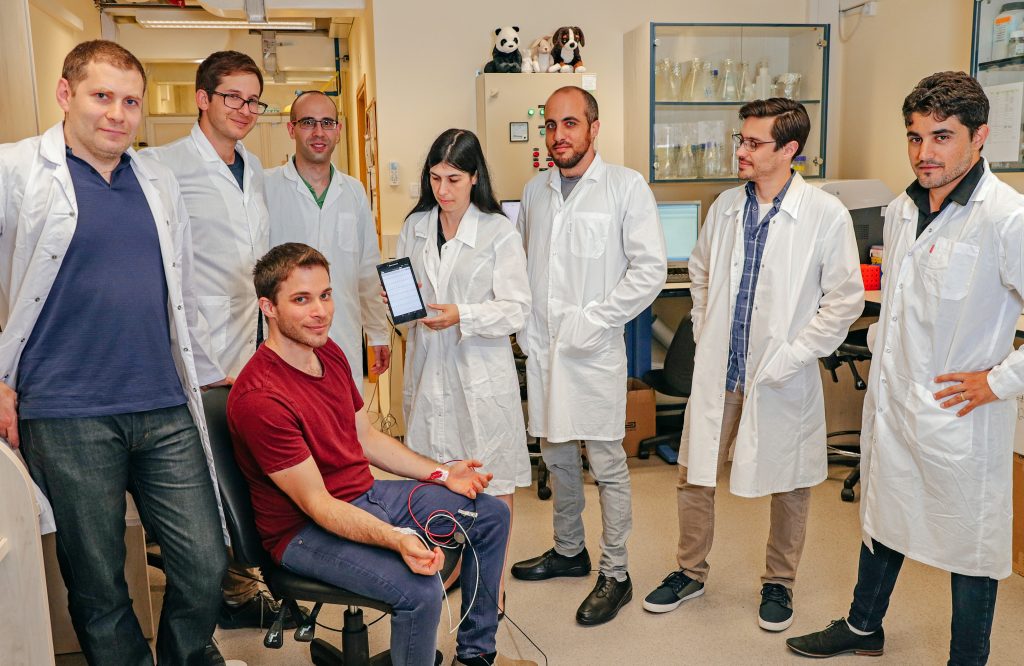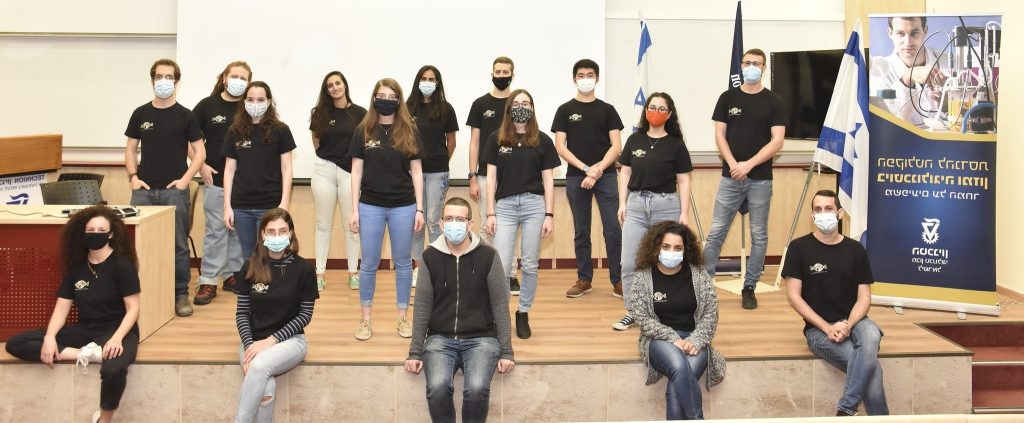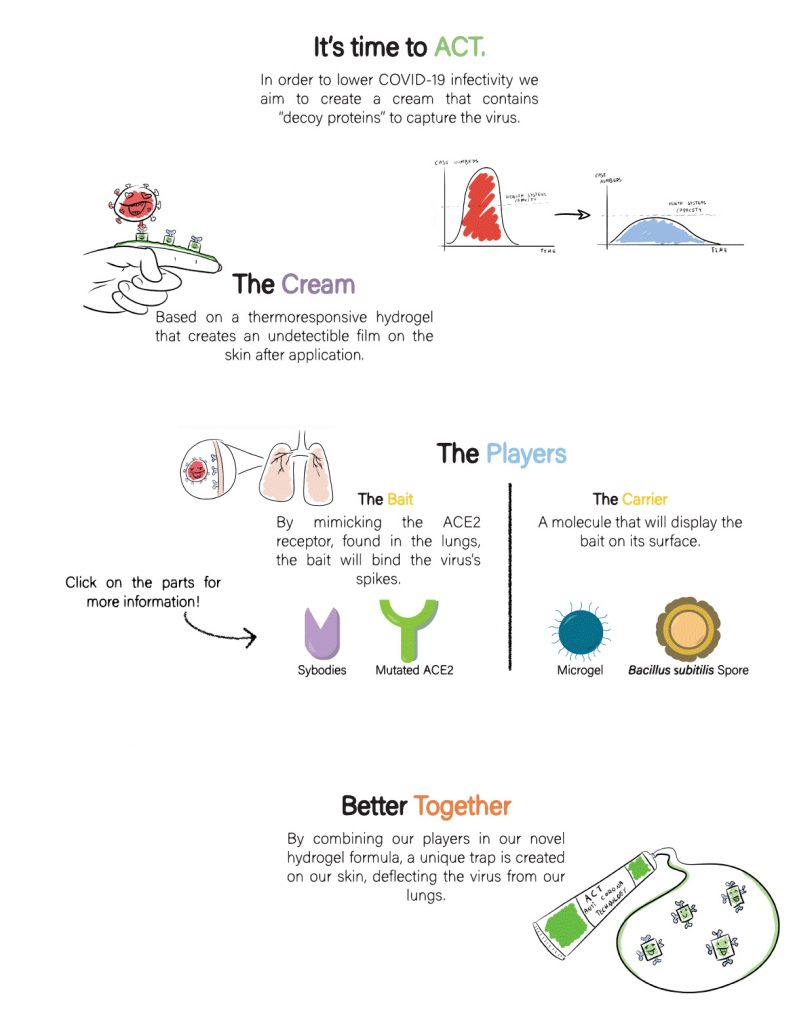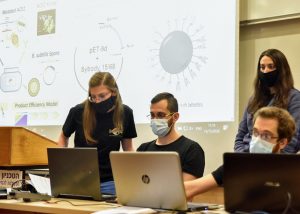Yearly Archives: 2020
“Scientists around the world in general and in the Technion, in particular, are working around the clock with events
like this. Our speaker tonight is a promising principal investigator and assistant professor of immunology
at the Technion which is a leading institution at the forefront of cutting-edge research on the disease.
Yotam Bar-On will explain the interactions between our immune system and the virus with its mutations or variants
along with distinctions between different vaccine approaches.”
Early warning systems for food contamination are taking a leap into a safer and healthier future with lab-on-a-chip monitoring technologies for the food industry being developed by Technion researchers within an EIT-Food Consortium.
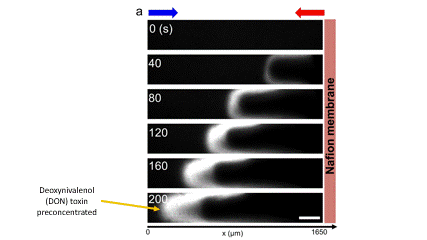
Toxin detection technology: Time-lapse fluorescent images of the electrokinetic preconcentration of Deoxynivalenol (DON) toxin into a preconcentrated plug of molecules within a microchannel for enhancement of detection sensitivity.
Food safety is crucial for food-producing companies from farm to fork, and fundamental to public health. Every year, over 23 million people in Europe become ill from contaminated food, leading to around 5,000 annual deaths. Food is generally monitored in facilities that use time-consuming methods. Analysis can take up to a week, which results in a significant rate of 50 weekly recalls of food products across the EU and the USA.
The Technion has developed a technology for sensitive, real-time detection of contaminants, validated in different environments. Bringing increased efficiency and precision, the technology is based on several concentration techniques in a lab-on-a-chip format. A lab-on-a-chip is a class of device that integrates and automates multiple laboratory techniques into a system that fits on a chip up to a maximum of a few square centimeters in size. By manipulating reagents on the microscale, effects such as rapid heating and mixing can be exploited.
The innovative solutions from Technion are expected to improve public safety, cut costs, and minimize the need for recalls. The early detection of contaminations can save lives, increase public trust, and bring a significant leap in efficiency to the food industry.
“Our solutions will improve societal well-being, minimize recalls and food outbreaks, and improve production efficiency,” says Prof. Yechezkel Kashi of the Faculty of Biotechnology and Food Engineering. “It is relatively inexpensive and will encourage all parties to check products throughout the supply chain, eliminating contaminated raw materials and products in real-time. This will help avoid recall events, which also damage food companies and public confidence.”
Prof. Kashi and Prof. Gilad Yossifon of the Faculty of Mechanical Engineering are leading the consortium with six European partners (EUFIC, Grupo AN, Maspex, Energy Pulse Systems, SwissDeCode, and Queen’s University, Belfast).
The European Union has allocated millions of euros to advance the future of food. There are three Technion research teams participating in EIT-FOOD projects, which have cumulative budgets of more than €2.25 million, supported by grants of the EU.
1,300 outstanding female high school students in science and mathematics attended the virtual event which showcased an array of opportunities flowing from academic studies in science and engineering at Technion.
“I used to watch “X-Men”, and it amazed me to see how they can change people’s DNA to become superheroes. I knew that I wanted to be a scientist.” These remarks were made by entrepreneur Maya Ashkenazi Otmazgin, a graduate of the Technion Faculty of Biomedical Engineering to hundreds of female students who participated in the 6th TechWomen event. TechWomen events are designed to encourage outstanding high school students to pursue their studies in mathematics and science. This year, the event was held for the first time online, live from the new studio at the Technion, which enabled the participation of more students than ever before.
The event was held courtesy of the Rosalyn August Foundation for the Empowerment of Young Women. August, who lives in Florida, greeted the students from her home, telling them: “I have always felt that women could do whatever they want. I believe in you and your leadership to change the world. You have talent that many women long for, and you are an inspiration for me. You are the future of the world. I salute you, and I will continue to support this important event.”
The event was moderated by astrophysicist Dr. Efrat Sabach, who completed her degrees at the Technion Faculty of Physics. Also taking part were Prof. Alon Wolf, Technion’s Vice President for External Relations and Resource Development, Yael Wiesel, a graduate of the Viterbi Faculty of Electrical Engineering and founder of “Zeekit” – a virtual dressing room; Dr. Naama Geva Zatorsky of the Rappaport Faculty of Medicine; researcher Michal Ackerman-Lambert from the Faculty of Biology and stand-up comedian Mor Chen.
Seven alumni and doctoral students took part in a video specially made for the event, entitled: “May I ask a question?” These included: Dr. Avital Schrift, director of a missile plant in the Israel Aerospace Industries Systems Missile and Space Division, and an Israel Defense Forces Award laureate for 2003, who completed her bachelor’s and master’s degree in the Viterbi Faculty of Electrical Engineering; Maya Ahskenazi Otmazgin, one of the founders of food companies MaoLac and MaoFoodTech, who completed her master’s degree in biomedical engineering and was selected this year for the Forbes 30 Under 30 list; Nora Nseir Manassa, co-founder and CTO at Nurami Medical, who completed a bachelor’s and master’s degree in the Faculty of Biomedical Engineering; Katia Zoubenko, who holds a bachelor’s degree from the Physics Faculty and a master’s degree from the Faculty of Materials Science and Engineering, where she is currently pursuing her doctorate; Yathreb Asaad, a PhD student from the Faculty of Biomedical Engineering at the Technion; Neta Blum, head of the Aviation Technology Division at MAPAT (Ministry of Defense), who completed her bachelor’s and master’s degrees at the Faculty of Mechanical Engineering and is currently pursuing her doctorate in the Faculty of Aerospace Engineering (she is also a member of the Forbes 30 Under 30 list); and Keren Yitzhak, who completed her bachelor’s degree from the Taub Faculty of Computer Science this year and today works at Google.
“In the army, I was exposed to computers and suddenly it interested me,” said Keren Yitzhak. “I began to understand the electronic devices we have in our hands and the things that we use on a daily basis at a whole new depth.”
The interviewees talked about their character as high school students (“nerdy, curious, outstanding”), about moments of crisis (“there were times I said enough, this doesn’t suit me!”), and about life as women in the industry. “When you are the lone women in the room where there are only men beside you,” said doctoral student Neta Blum, “the situation puts you at the forefront and makes you stand out – what’s more, I’m a redhead.”
In the feedback sent to the event organizers, the participants wrote that the event focused on study options at the Technion and strengthened their confidence in the viability of studies and their ability to meet the challenge. “I also previously considered studying at the Technion, but I told myself that I was not good enough,” wrote one participant. “After today’s lectures I realized that everyone feels like me.” “I wanted to study at the Technion before too,” wrote another, “This lecture just strengthened my desire. I had butterflies in my stomach.”
Technion’s Vice President for External Relations and Resource Development Prof. Alon Wolf told the students that: “Technion has been working hard to raise the percentage of women among graduate students and faculty members. Only recently, two new and excellent faculty members, who were doctoral students in my laboratory, joined the Technion, and I am very proud of them for the impressive path they have taken. Each and every one of you has a place at the Technion and I hope to see you on campus in a few years.”
Technion researchers, together with colleagues in Russia, have developed a technology for the accurate diagnosis of cardiac disorders based on automated analysis of routine electrocardiography
Technion-Israel Institute of Technology researchers have developed a technology for the accurate detection of heart problems, based on routine electrocardiography. They have also built a database and an analytic tool that will provide doctors and other users with an automated diagnosis of a combination of eight common types of heart disease, quickly and with unprecedented accuracy.
The study, published in Nature Research’s Scientific Reports, was headed by Professor Yael Yaniv, Director of the Bioelectric and Bio-energetic Systems Laboratory in the Faculty of Biomedical Engineering at the Technion, Professor Assaf Schuster, co-chair of the Technion Center for Machine Learning and Intelligent Systems (MLIS), and doctoral student Vadim Gliner of the Taub Faculty of Computer Science. Vladimir Markov, head of the Laboratory for Systems Programming at Novgorod University and Arutyun Avetisyan, director of the Institute of Systems Programming at the Russian Academy of Sciences in Moscow partnered in the study.
Electrocardiography (ECG) is the most commonly used technology for the diagnosis of changes in heart function. It was first demonstrated in 1903, granting its inventor, Willem Einthoven, the Nobel Prize in Physiology or Medicine in 1924. As opposed to the first electrocardiogram machine, which weighed more than 250 kilograms, today’s machines are mobile devices, which, on the basis of a quick test, deliver data on the condition of the heart, including arrhythmia and other disorders. The non-invasive test measures the electrical signals generated by the heart muscle tissue through the use of external electrodes placed in 12 locations on the body, which deliver measurements from 12 different angles (“leads”). Thanks to the relative simplicity of the test and the low cost of the device, the test is available even in small, remote clinics.
But despite the significant development of ECG technology and the reduction of the size of the device to the dimensions we know today, there has been no change in the method used to interpret the results. They continue to be interpreted by a cardiologist who reads the printout. Naturally, this method involves subjective elements, and it is therefore no wonder that different cardiologists are likely to reach different clinical conclusions on the basis of the same printout.
This being the case, interpretation is the bottleneck that has been a source of preoccupation for many research teams around the world. Attempts to automate interpretation began as early as 1957, mainly in the context of ventricular fibrillation, but the performance of these systems was unimpressive. Even the introduction of AI has so far led only to the analysis of one printout at a time and has not delivered an especially high level of accuracy. As a result, the risk of underdiagnosis of critical heart disease remains unresolved.
That is why the technology developed by the Technion researchers and their Russian colleagues is such good news: it demonstrates unprecedented accuracy in the interpretation of numerous ECG results and delivers a diagnosis of different cardiac disorders simultaneously. The technology automatically analyzes the ECG results (or scanned images of the signals) based on augmented neural networks – one of the most efficient tools in the AI world. These networks learn different patterns by being trained on numerous samples, and the system developed by the research team was trained on over 40 thousand standard ECG recordings – ECGs performed on more than 6,800 patients in 11 hospitals.
The tens of thousands of recordings were reviewed and interpreted by cardiologists, who classified them according to nine different categories – normal heart function and eight clinical disorders. The new system demonstrated 96% average accuracy in diagnosing the various conditions, compared to 80% for currently available algorithms. The new system monitors all clinical conditions with an accuracy level that is higher than that achieved by its predecessors: ventricular fibrillation, for example, was diagnosed with 98% accuracy compared to 92% for currently available algorithms. Left bundle branch block (LBBB) – blockage of electrical impulses to the heart’s left ventricle – was diagnosed with 100% accuracy versus 85%. Normal heart function was diagnosed with 96% accuracy compared to 82%.
The achievement demonstrated by the Technion researchers paves the way for the early detection of heart disease, including in reliance on photographs of the recording on a smartphone. The researchers emphasize that the system does not replace the physician, but rather provides a form of “second opinion” and is likely to detect problems that a human review of the recordings, no matter how professional, is liable to miss.
As mentioned, the Technion researchers have developed an open-source database for the benefit of doctors and other users. The research project was supported by the Ministry of Science and Technology, Russian Foundation (RFBR), and the Yad Hanadiv Foundation.
Click here for the article in Scientific Reports.
Technion students have harnessed viruses found in the environment of fruit trees to prevent spoilage of fruit juices – a phenomenon that causes tens of millions of dollars’ worth of damage each year. The development earned the students from the Technion’s Faculties of Biotechnology & Food Engineering, and Biology, first prize in a competition held as part of the MicroBiome-Push project conducted within “Food Solutions,” an educational program of the European food consortium, EIT Food
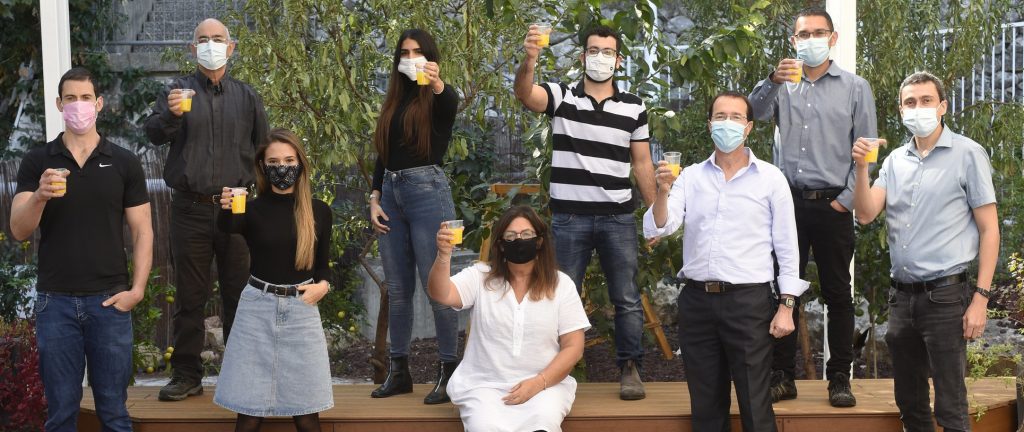
The Microbes team, mentors and the Dean: Front row: Right to left: Asst. Prof. Avi Shpigelman, Prof. Yoav Livney (Leading the Technion project), Dean of the Faculty of Biotechnology and Food Engineering, Prof. Marcelle Machluf, Rachel Bitton, Itzik Engelberg Back row, right to left: Assoc. Prof. Uri Lesmes, Alon Romano, Leechen Mashiah and Prof. Yechezkel Kashi
Students from the Faculty of Biotechnology and Food Engineering, and the Faculty of Biology at the Technion earned first place in an international competition held by Europe’s leading food innovation initiative, EIT Food. The students harnessed a bacteriophage – a virus that infects bacteria – to prevent spoilage of fruit juices, a phenomenon causing damage estimated at millions of dollars each year. Professor Marcelle Machluf, dean of the Faculty of Biotechnology and Food Engineering, said, “International projects such as this are the very essence of the Faculty and its way of teaching future generations to think outside the box, to be entrepreneurial, and to broaden the knowledge we are able to provide in the classroom.”
The international competition was held in the framework of the MicroBiome-Push project, which is part of the Food Solutions educational program. The goal was to solve problems in the food sector by connecting companies in the food industry (PepsiCo, Puratos and Agricolus) with undergraduate and graduate students from four universities – the Technion, the University of Turin in Italy, the University of Reading in the UK, and the University of Helsinki in Finland. Nine groups of students competed, including two from the Technion.
The two Technion groups chose challenges posed by the global PepsiCo corporation. The first was to solve the problem of spoilage of fruit juices, while the second was to utilize the potato peels that are left over from the production of potato chips. The groups were accompanied by four mentors from the Faculty of Biotechnology and Food Engineering: Professor Yoav Livney, who headed the Technion’s activity in the project, Professor Yechezkel Kashi, Assistant Professor Avi Shpigelman, and Associate Professor Uri Lesmes. According to the mentors, “The two Technion teams did an amazing job, and despite the limitations posed by COVID-19, they succeeded in creating original, effective solutions. What’s more, they presented the viability of the ideas to the corporations, and showed their inherent business potential.” Members of the winning team, the Microbes, are Itzik Engelberg, Alon Romano, Leechen Mashiah, and Rachel Bitton, and members of the second Technion group, Biomy, are Omer Sabbah, Yuping Kao, Or Shapira, Michael Buzaglo, and Lior Kaufman.
The Microbes chose to address the acute problem of spoilage of natural fruit juices, which in the U,S. alone causes damage estimated at around $32 million each year. The culprit is ACB, or Alicyclobacillus acidoterrestris. This bacterium, found in the ground in which fruit trees grow as well as in all parts of the tree itself, although not harmful to humans, releases a natural substance called guaiacol into the juice, spoiling its taste and smell. This occurs in a broad variety of juices, including orange, mango, pear, grape, tomato, and others, and leads to the loss of large quantities of juice, as well as massive financial losses.
In the course of evolution, the bacterium has developed high resistance to hostile environmental conditions, enabling it to also survive the processes involved in juice production – cleaning, extraction, pasteurization, and filling. As a rule, pasteurization is efficient in destroying bacteria that are harmful to health or adversely affect juice quality. But this is not the case with ACB, since the juice cannot be heated to higher pasteurization temperatures or for a longer time without compromising its quality and nutritional values. PepsiCo has been looking for a creative solution that will prevent this harmful phenomenon.
“Since the problem has its origins in nature – a bacterium that lives in the soil – we looked for a natural solution,” explain doctoral students and team members Alon Romano and Itzik Engelberg. “After all, nature is a ‘laboratory’ that has been perfecting its solutions for billions of years, and our assumption was that solutions that developed in the evolutionary process could also serve us as a solution for dealing with the problem of ACB in the food industry.”
After much searching and numerous analyses, the choice was a bacteriophage, a virus that infects bacteria naturally and in a very specific way. Bacteriophages are abundant in nature, and following strenuous research, the group succeeded in isolating and identifying a bacteriophage that destroys the harmful bacteria. It takes just a small dose to efficiently eliminate the bacteria, and because it does so selectively, it is safe for use and it has no harmful effects on human health.
The competition was held as part of the MicroBiome-Push project since it focused on finding solutions to challenges related to the natural microbiome, the microorganisms populating a particular environment. The microbiome includes bacteriome, virome, and mycobiome (which represent, respectively, the assemblages of bacteria, viruses, and fungi), and the winning solution in fact harnesses a specific virus present in the phytosphere (the microbiome of the plant and its environment) to combat a specific bacterium from that same environment. The fact that this is a natural, inexpensive solution that does not involve genetic engineering is expected to expedite the application of the technology in juices and to reduce the need for preservatives. Moreover, the addition of the virus to the juice does not affect it in terms of religious dietary laws – Jewish (kashrut) and Islamic (halal).
The second Technion group, Biomy, also tackled a far from simple challenge and developed the PotatALL concept, which includes a number of creative solutions for treating potato peels left over in the process of producing potato chips. Team members presented a process to produce from the peels a raw material used to create eco-friendly packaging, as well as a dip made from potato peel. This comprehensive and creative solution also met with the judges’ praise. The intention is for the dip to be served in small packs similar to ketchup, along with fries, and to package it in the eco-friendly packaging made from the peel. The solution provides a perfect way to fully utilize all parts of the potatoes while mitigating the environmental impact.
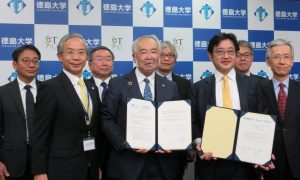 The new agreement will encourage research collaboration among top Japanese and Israeli researchers by expanding scholarly ties, facilitating academic cooperation, increasing educational opportunities, and promoting international and inter-cultural understanding. One of the main components of the agreement is the establishment of a track for doctoral students and post-doctoral researchers from Tokushima University to come to Technion on long-term programs, and vice-versa.
The new agreement will encourage research collaboration among top Japanese and Israeli researchers by expanding scholarly ties, facilitating academic cooperation, increasing educational opportunities, and promoting international and inter-cultural understanding. One of the main components of the agreement is the establishment of a track for doctoral students and post-doctoral researchers from Tokushima University to come to Technion on long-term programs, and vice-versa.
Nichia Corporation, which is located in Tokushima prefecture (Japan) and has close ties with both Technion and Tokushima University, is playing a key role in the new agreement. The company will sponsor joint research projects and support scholarships for PhD students and postdocs on long-term exchange programs between Technion and Tokushima University.
Tokushima University in Tokushima, Japan, was established as a national university in 1949. It is famous as a comprehensive university with a wide range of specialties. Tokushima University comprises eight graduate schools: Sciences and Technology for Innovation, Integrated Arts and Sciences, Medical Sciences, Oral Sciences, Pharmaceutical Sciences, Nutrition and Bioscience, Health Sciences, and Advanced Technology and Science. Undergraduate programs are offered through six faculties: Integrated Arts and Sciences, Medicine, Dentistry, Pharmaceutical Sciences, Science and Technology, and Bioscience and Bioindustry. In addition, Tokushima University has research-oriented institutes, including the Institute of Advanced Medical Sciences and the Institute of Post-LED Photonics. It is also home to the Industry-University R&D Startup Leading Institute, promoting academic-industrial collaboration and facilitating the formation of startups.
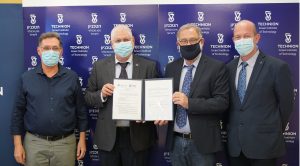 Nichia Corporation initiated the collaborative agreement between Technion and Tokushima University and will sponsor activities involving both universities. Nichia Corporation, headquartered in Tokushima, Japan, is a manufacturer of functional chemicals and opto-semiconductors. The company is a research and development-oriented company with two main business divisions: optical semiconductors, such as light-emitting diodes (LEDs) and semiconductor lasers (LDs), and functional chemicals, such as cathode materials and phosphors for lithium-ion batteries. The company maintains one of the world’s top market shares in each field of manufacturing. The company was founded in the manufacture and sale of pharmaceutical raw materials and has expanded into the manufacture of phosphors and other products by utilizing its reaction, purification and powder control technologies. Through the phosphor business, the company entered the optical semiconductor business and established the world’s first mass production technology for blue LEDs and blue-violet LDs. These technologies are applied to white LEDs in cell phones, televisions, automobiles and lighting. The company also has research institutes and a technical center in Anan (Tokushima Prefecture), Yokohama (Kanagawa Prefecture), and Shimosuwa (Nagano Prefecture), where it conducts cutting-edge research in the field of light and engages in research and development to drive innovation. Nichia and Tokushima University have a long and close relationship that spans decades of joint research and Nichia frequently hires Tokushima graduates.
Nichia Corporation initiated the collaborative agreement between Technion and Tokushima University and will sponsor activities involving both universities. Nichia Corporation, headquartered in Tokushima, Japan, is a manufacturer of functional chemicals and opto-semiconductors. The company is a research and development-oriented company with two main business divisions: optical semiconductors, such as light-emitting diodes (LEDs) and semiconductor lasers (LDs), and functional chemicals, such as cathode materials and phosphors for lithium-ion batteries. The company maintains one of the world’s top market shares in each field of manufacturing. The company was founded in the manufacture and sale of pharmaceutical raw materials and has expanded into the manufacture of phosphors and other products by utilizing its reaction, purification and powder control technologies. Through the phosphor business, the company entered the optical semiconductor business and established the world’s first mass production technology for blue LEDs and blue-violet LDs. These technologies are applied to white LEDs in cell phones, televisions, automobiles and lighting. The company also has research institutes and a technical center in Anan (Tokushima Prefecture), Yokohama (Kanagawa Prefecture), and Shimosuwa (Nagano Prefecture), where it conducts cutting-edge research in the field of light and engages in research and development to drive innovation. Nichia and Tokushima University have a long and close relationship that spans decades of joint research and Nichia frequently hires Tokushima graduates.
The academic cooperation between the Technion and Tokushima University will be partially funded by the Tokushima International Science Institute (TISI), administered jointly by Tokushima University and Nichia. Both Technion and Tokushima University stand to benefit significantly from this new relationship. Japan is a global leader in technology and Technion students pursuing advanced degrees will enjoy new opportunities to engage with students and researchers from this important country.
A team of Technion researchers has presented new findings relating to the gradual deterioration of the body’s protein quality control system during aging. The study, which was published in PNAS – a peer-reviewed multidisciplinary scientific journal published by the National Academy of Sciences of the United States of America – was headed by Assistant Professor Reut Shalgi, research fellows Niv Sabath and Flonia Levy-Adam, and Ph.D. student Amal Younis, all of the Rappaport Faculty of Medicine.
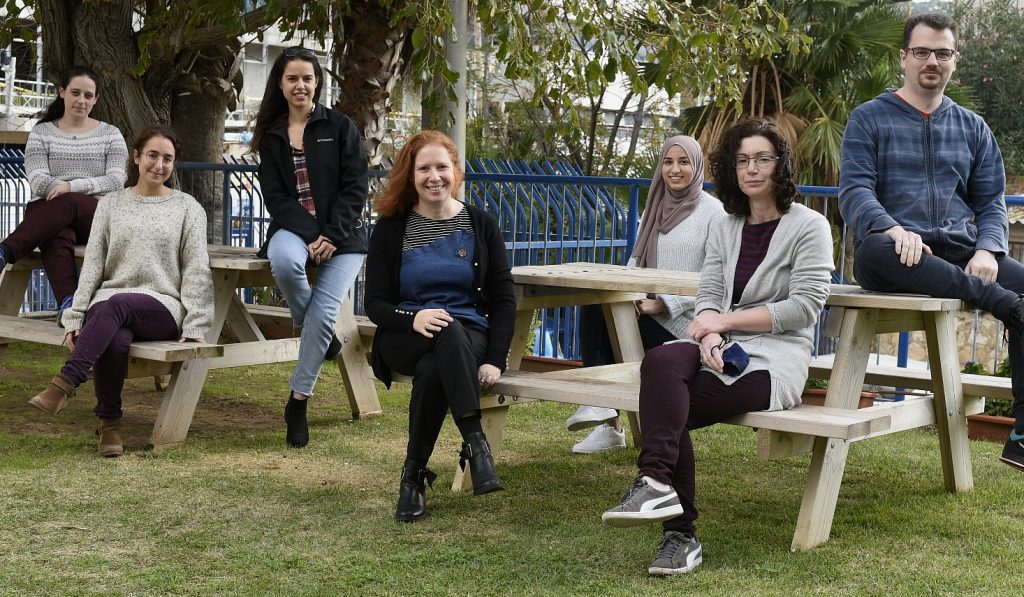
Group photo(L-R) : Kinneret Rozales, Shani Hadar, Amal Younis, Prof. Reut Shalgi, Tahani Kadah, Flonia Levy-Adam and Anatoly Meller
The study focuses on a vital control system that protects the cell against the accumulation of damaged proteins. When this system is compromised, aggregation of these proteins occurs in the cell and has a toxic effect, particularly when it occurs in the brain.
Proteins are active participants in all biological processes occurring in and outside of the cell, and their function depends on folding, i.e. the physical process in which they acquire a specific three-dimensional structure that enables them to interact normally with other cell components.
Proteins often misfold, which not only prevents them from fulfilling their function but also causes them to become “sticky” and accumulate in the cell, forming toxic aggregates. These toxic aggregates contribute to processes intrinsic to the development of neurodegenerative diseases, including Alzheimer’s, Parkinson’s, ALS, and Huntington’s disease.
Protein damage occurs frequently, and during the course of evolution, a cellular control mechanism has evolved that tests the quality of proteins from the moment they are synthesized (“born”) on the ribosome until they die. This mechanism, called proteostasis, identifies damaged proteins and deals with them in one of three ways: it refolds them; sequesters and inactivates them so they will not affect cellular activity; or sends them to the proteasome, the cellular trash can. This mechanism ensures that damaged proteins, which occur in healthy cells as well, are treated and do not accumulate to form toxic aggregates, such as those that lead to neurodegenerative disease. However, the aging process involves the deterioration of the proteostasis mechanism. This deterioration, previously demonstrated in worms (nematodes), has now been demonstrated for the first time in aging human cells using transcriptome-wide characterization of gene expression, splicing, and translation.

Figure legend: Immuno-fluorescence imaging of young (right) or senescent (left) heat-shocked fibroblasts, where two central transcription factors (TFs), ATF6 (green) and HSF1 (red), were stained. While in young cells, both TFs enter the nucleus, a necessary step for the activation of an optimal transcriptional response to stress, in senescent cells both factors do not fully enter the nucleus. Additionally, HSF1 generates a special punctae structure in young cells, which is optimal for transcriptional activation, but in senescent cells these structures are disorganized.
In the article, the Technion team presents the phenomenon in the context of heat stress. The researchers demonstrated that, as opposed to young, healthy cells, in stressed senescent cells (i.e. cells which have undergone cellular aging), the transcriptional activation of the heat shock response was found to deteriorate significantly. Although senescent cells showed stress sensing, unlike young cells they were unable to trigger the unfolded protein response (UPR) and the heat shock response (HSR), related transcriptional responses necessary to fully overcome the stress. Two important stress transcription factors, which are responsible for mounting this response, were found to mis-localize and not fully enter the cells’ nucleus. The researchers also found the function of the proteasome – the cellular trash can – was impaired following heat stress in aging cells, and did not recover even after given time to recover from the shock.
Prof. Reut Shalgi holds a B.Sc. in Computer Science and Life Sciences from Tel Aviv University, and an M.Sc. in Bioinformatics, and a Ph.D. in Life Sciences from the Weizmann Institute of Science. In October 2014, following a postdoctoral fellowship at MIT, she became a faculty member at the Technion in the Rappaport Faculty of Medicine. Her lab combines computational and molecular biology to battle questions related to protein homeostasis regulation in stress and neurodegeneration. She is presently also a member of the Rappaport Family Institute for Research in the Medical Sciences and the Prince Center for Neurodegenerative Disorders of the Brain.
Click here to read the PNAS article.

The European Federation of Food Science and Technology, EFFoST, has wrapped up its 34th annual conference on the theme “Bridging High-tech, Food-tech and Health: Consumer-oriented Innovations.” The conference, held online for the first time, took place on November 10-12, 2020, with the participation of over 500 researchers, industry people, and students. It was hosted by researchers from the Technion’s Faculty of Biotechnology and Food Engineering. This was also the first time the major international event, which has taken place yearly since 1986, was hosted by researchers from institutions outside of Europe. The EFFoST2020 Conference was organized by Technion researchers Associate Professor Uri Lesmes (conference chair), Professor Ester Segal, Dr. Maya Davidovich-Pinhas, and Dr. Avi Shpigelman with Dr. Zvika Hayouka of the Hebrew University of Jerusalem, and accompanied by an experienced scientific committee comprised of world-class Israeli and international researchers.
“As food scientists, we have a commitment to humanity and a responsibility to drive dramatic moves that are needed to advance the world of food in normal times, and even more so during the current crisis,” said Prof. Lesmes. “The COVID-19 crisis came at a time when humanity is increasingly aware of the economic, environmental, and health implications of the food sector – an industry that is leading to widespread carbon emissions, significant environmental damage, and affecting human health and well-being. This is the background that has spurred efforts of creative solutions that include the manufacture of algal- and insect-based protein, cultivated meat, and a rise in the use of plant-based food sources. In Israel, all of this is augmented by the rapid development of the Israeli food-tech ecosystem into a “food-tech nation” that places Israel at the forefront of research and development in this domain.”
The conference opened with a unique day of live online broadcasts that included lectures, scientific discussions, and the introduction of Israeli startups. “These are strange times,” said EFFoST President Prof. Olga Martin Belloso, “but we are treating them as a pilot, as an opportunity to explore new ways of teaching and research and to learn how to maintain a healthy work-life balance. The pandemic has been accompanied by a great deal of distress and hardship, but for the world of science it has also presented opportunities, inviting creativity, innovation, and community collaboration – elements that are highly essential to the continued development of the food sector.”
Artificial intelligence, alternative proteins, and cultivated meat products
The opening speeches were followed by lectures by the conference’s invited speakers. Professor David Raubenheimer of the University of Sydney (Australia), talked about human and animal eating behaviors highlighting the importance of protein in a balanced diet. Professor Indrawati Oey of the University of Otago (New Zealand), talked about nonthermal food processing. According to Prof. Oey, “Nonthermal food processing has many advantages, including the preservation of nutritional values, reduced energy consumption, and a reduction in waste. The problem is that companies are daunted by the prospect of entering this new sphere, since it requires a huge investment, which they perceive as risky. Indeed, we must consider the various implications, including side effects. That said, I am in no doubt that as awareness of the advantages of nonthermal processing grows, more and more companies will enter the business. Those of us in the academic world have a very important role in bridging the gap between theory and implementation, and in furthering innovative technologies aimed at implementation in the food industry.” Professor Alexander Mathys of ETH-Zurich (Switzerland) further elaborated on the use of technology and life cycle assessments to promote and optimize the use of novel and more sustainable protein sources like algae and insects.
Professor Alejandro Marangoni of the University of Guelph, Canada, presented methods for the crystallization of fats to create natural butter and fat substitutes. Professor Julian McClements of the University of Massachusetts spoke about understanding digestive processes in order to create personalized food, for example, controlling the digestion of fats and proteins while efficiently delivering vitamins and antioxidants. Professor Christoph Hartmann of Nestle Switzerland presented the use of Artificial Intelligence (AI) in food developments for the customization of taste and texture, taking raw materials and consumer preferences into account. Dr. Liz Specht of The Good Food Institute concluded the day by discussing the opportunities for alternative protein sources to advance the sustainability of the food sector, and for the creation of future products such as cultivated meat products that will mitigate the environmental damage caused by the food industry.
Prof. Ester Segal of the Faculty of Biotechnology and Food Engineering at the Technion spoke about the innovative technology she developed – active, antimicrobial food packaging, which reduces the need for preservatives, extends the shelf life of food products, and prevents harm to health as a result of the consumption of spoiled food. The development includes porous sensors and oils that prevent a buildup of germs and other contaminants on food. The technology is already in commercial production and is contributing to the health of the population, in addition to the economic and environmental contribution of reduced food waste achieved through the protection of foods against spoilage.
According to estimates, about one-third of all food produced in Israel is thrown out, representing millions of tons of food products, and world figures are similar. Prof. Segal’s technology was developed and commercialized by NanoPack, a consortium inaugurated in January 2017 and led by Prof. Segal. The consortium is comprised of 18 leading research institutes and industrial companies from Belgium, Austria, Norway, Spain, Israel, Ireland, Denmark, Portugal, France, Germany, and Holland. The EU supported the consortium for three years, addressing the scientific, technological, economic, safety, and regulatory challenges. NanoPack established pilot production lines in an industrial environment, which tested all phases of the development and production of the packaging.
On the second and third days of the conference parallel sessions were held, featuring more than 100 talks, including lectures by faculty members and leading students from the Technion, as well as live virtual meetings and discussions with the speakers in which a broad spectrum of topics were discussed. These included the use of ‘omic’ technologies and AI to understand the composition of food, its digestion, advanced food processing technologies, and personalized food engineering.
At the forefront of technology: leading Israeli startups
To present a few of the innovations in the Israeli foodtech arena, the conference hosted three Israeli startups:
- Redefine Meat, winner of the 2018 EIT Food Accelerator Network program led by the Faculty of Biotechnology and Food Engineering at the Technion with the Stauss group. The company developed a 3D meat printing technology and prints plant-based meat and meat substitutes;
- Amai Proteins, which uses AI to develop innovative sweeteners based on protein engineering;
- Solutum, which develops biodegradable plastic. In her talk, Solutum founder Sharon Barak explained that, “Each year, plastic weighing 400 million tons is manufactured, and about half of that plastic is used for disposable products. One of the problems is that plastic doesn’t just disappear – all the plastic that has been manufactured since it was invented is still out there. This is where we come into the picture with our development – biodegradable plastic. And not only is it biodegradable, but it dissolves at the time we defined in advance. We believe that this development will lead to a dramatic change and will put a stop to the damage to the environment.”
In his closing remarks, Prof. Uri Lesmes said, “Population growth, the COVID-19 pandemic and growing awareness of human health and environmental quality have created many challenges for the food industry, and it is only through collaboration between industry and academia that we will be able to craft innovative, creative science- and technology-based solutions. This is precisely the goal of the conference – to share scientific and technological knowledge and forge partnerships that will enhance the food sector’s ability to deliver solutions that are healthy, tasty, and diverse, in alignment with environmental awareness, the complexity of the food chain, and human diversity. I have no doubt that the EFFoST2020 Conference will lead to a better understanding of the challenges we face, and to the use of 21st century science and technology to craft creative solutions that will promote diversity in the food world, the availability of products, their alignment with different consumer preferences and their impact on the way we live, our health and the environment. The Technion is honored to have been a pioneer in organizing the conference in these challenging times, and to be a contributor to the advancement of scientific activity with a purpose.”
A Technion student team recently won a gold medal in the iGEM international synthetic biology competition for work developing an active gel to capture SARS-CoV-2 viral particles, preventing the infection of host cells. Unlike existing sanitization products, the gel provides active skin protection for hours and does not damage the skin microbiome.
For the seventh time, Technion has won a gold medal at the iGEM (International Genetically Engineered Machine) Competition in synthetic biology. This year, their winning research is an active gel to capture COVID-19.
COVID-19 is transmitted via two main routes – inhalation of airborne droplets containing millions of viral particles emitted by infected people through coughing, sneezing, speaking, and breathing, or by touching the face following contact with contaminated surfaces. The goal of the Technion team, most of whom are students in the Faculty of Biotechnology and Food Engineering, was to develop a product that would lower contact infection.
The gel offers two prominent advantages over current sanitization solutions. The first is its long-lasting protection: the gel works for hours. The second is that the gel is selective: it does not harm the skin microbiome or the body’s cells, as it specifically targets COVID-19.
The prestigious iGEM Competition was initiated by the Massachusetts Institute of Technology (MIT) in 2004 to provide students, especially undergraduates, with an opportunity to experiment in scientific and applied research in synthetic biology. Technion teams have participated since 2012, following an initiative by Professor Roee Amit, head of the Synthetic Biology Laboratory for the Decipherment of Genomic Codes in the Faculty of Biotechnology and Food Engineering. “The achievements of the Technion’s iGEM teams are significant,” said Prof. Amit. “They do not merely amount to medals, since we have accumulated research and meaningful intellectual property that are expressed in scientific articles and in a patent published by two of our teams.”
This year, the competition was held online for the first time, with the participation of 256 teams from universities across the globe. The Technion team was led by students Tomer Antman and Hadas Yung, who joined Prof. Amit’s lab during their second-year studies to get what they called, “a taste of the world of research.” At the beginning of the year the students proposed various ideas for their joint project, but COVID-19 shuffled the cards, leading them to choose the challenge of breaking the chain of infection. As Mr. Antman says, “We knew that when it came to the COVID crisis we had to take action, not to just wait in the hope of positive developments. We took a decision to create those developments – we decided to act.”
“We learned that SARS-CoV-2 is able to survive on the skin for hours, several times longer than flu viral particles,” explains Ms. Yung. “Fortunately, common disinfectants were found to be effective against the virus, but they have two disadvantages – they destroy the virus only at the time they are used with no lasting effect, and they also damage our skin’s microbiome, the delicate balance of bacteria, viruses, and fungus that live on our skin, which plays an important role in our overall health.”
“We compare the virus to a fish and the system to fishing,” Mr. Antman adds. “The SARS-CoV-2 gateway to the host cells is the ACE2 protein, so our “bait” is engineered ACE2 and another ‘decoy protein,’ which entices the viral particles to attach to it. The ‘hook’ is the element that carries the bait, and the’“fishing rod’ is the gel itself, which holds them all together.”
One of the conditions for participating in the international competition is community contribution. For this purpose, the team joined forces with the student teams from Tel Aviv University and Ben-Gurion University to focus on reducing racial prejudice and racism in STEM (science, technology, engineering, and mathematics) studies. The 14-member Technion team, composed of 7 women and 7 men, was also one of four teams nominated for an “Inclusivity” award in the competition.
The members of the Technion team are: Hadas Yung of Haifa, Tomer Antman of Kibbutz Yad Mordechai, Amir Betker of Haifa, Dor Josef of Haifa, Ella Samuel of Kfar Hess, Ilana Elizarov of Netanya, Niv Skarbianskis of Netanya, Noa Weiss of Haifa, Shanny Ackerman of Binyamina, Shany Greenstein of Ramat Gan, Shay Bamany of Holon, Yara Zeibaq of Acre, Saar Shaviv of Haifa, and Zixuan Li of Shantou, China.
The team expressed gratitude for the Technion faculty members – Prof. Roee Amit, Prof. Boaz Mizrahi, Prof. Esti Segal, and Prof. Yuval Shoham – who helped them with the project, and the tutors who accompanied them – Naor Granik, Tzila Davidov, Noa Eden-Navon and Inbal Vaknin, all of the Faculty of Biotechnology and Food Engineering.






